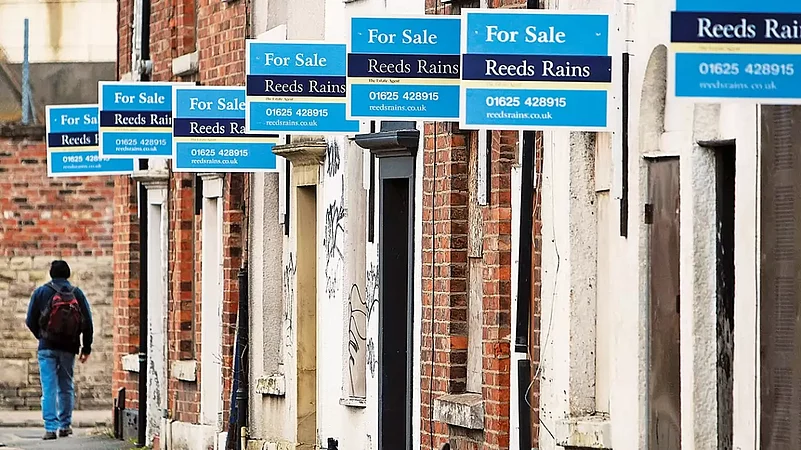“Win back the country for Jesus,’’ “Reclaim America from the Devil,’’ “I am for God and Church and will vote out the Democrats.” These slogans and placards were raised at a recent Republican rally in the US, where religion has become an important element of right-wing politics. The religious right is a political movement which has been around since the 70s but is now finding resonance in a deeply polarised US.
The Christian right has found a new patron in Donald Trump. They support his conspiracy theories and solidly back his version of the Republican Party. Pastors are working overtime to defeat Democratic opponents in the mid-term elections that will decide which party controls both chambers of the US Congress.
A Voice of America (VoA) report from a gathering of a ReAwaken America Tour, in Pennsylvania, offers a flavour of the moment: “Pastor Mark Burns, touted as ‘Donald Trump’s Pastor’ brought the crowd to its feet when he said, ‘Are you ready to go to war for the Lord Jesus Christ? Shout ‘Yeeeeeahhhhhhh! I’m here to declare war on every race-baited Democrat and every evil scheme that comes from the gates of hell.’”
ALSO READ: What Does Secularism Mean Around The World?
Since April 2021, the Reawaken America Tour has been underway to energise the Republican support base. It has held meetings in around 16 cities and tickets for attendance are reportedly sold out within hours. The ReAwaken America Tour is part conservative Christian revival and part Trumpian Republican politics. The show is the brainchild of former Trump National Security Adviser, Michael Flynn. He conceived it soon after receiving a pardon from Trump in the last days of his presidency. Trump’s son, Eric, often attends these meetings and, together with the rest of the speakers, keeps insisting that his father had won the 2020 presidential elections. Speakers question the separation of church and state, something guaranteed by the First Amendment. The bottom line is that the US, for these folks, is White, Christian, anti-abortion, anti-immigrant, against gay marriage and everything else that the liberal ethos promotes.
Secularism, the separation of religion from politics, has taken a global hit in the last two decades. Liberal ideals that dominated the world since the end of WWII are on the decline everywhere. Trump has succeeded in mainstreaming fringe groups in the US and the malaise is spreading across Europe.
ALSO READ: Power Politics: History Of Indian Secularism
In September, Italy voted in a coalition government of the far right and the centre right. The new Prime Minister, Giorgia Meloni, is the leader of a fringe group called Fratelli d’Italia (Brothers of Italy). Meloni has been politically active in it since she was a teenager and was part of a neo-fascist group in Rome. “Italians have sent a clear message in favour of a right-wing government led by Brothers of Italy,” she declared after her election win. In a speech in Spain last year, she gave an idea of what she and her party are all about.

“Yes, to the natural family, no to the LGBT lobby, yes to sexual identity, no to gender ideology, no to Islamist violence, yes to secure borders, no to mass migration, no to big international finance, no to the bureaucrats of Brussels!” she bellowed. “I am Giorgia, I’m a woman, I’m a mother, I’m Christian,” she declared in another speech in 2019. Her new minister for family and birth rate is Eugenia Roccella, known for her an anti-abortion and anti-gay views.
But the Big Daddy of the Far Right in Europe is Hungary’s Prime Minister, Viktor Orbán, who won his fourth term in office earlier this year. He openly advocates against the “mixing of races,” saying “We [Hungarians] are not a mixed race … and we do not want to become a mixed race.” He added that countries where Europeans and non-Europeans mingle were “no longer nations”.
In France, Marine Le Pen, and her Rassemblement National (National Rally) has long become a force in politics. Her father, Jean-Marie Le Pen, was president of the far right Front National (National Front) party. In his time, nobody gave them much of a chance. Now the scene has changed and his daughter can dream of actually winning the presidency. But the rising star is Jordan Bardella, the 27-year-old leader who has taken over as president of the party. His task is to prepare the French far right party for the 2024 elections, while Marine is expected to take a shot at winning the French presidency in 2027.

Why is secular politics being challenged in many parts of the world and why are rightwing fringe groups coming into the mainstream?
“The appeal of right wing politics in Europe and the UK can broadly be understood as an aftermath of two structural crises. One, the 2008-09 financial meltdown that exacerbated domestic economic inequalities and discontent to such an extent that neither the European welfare state nor the promise of equitable distribution could fully address people’s needs. The struggles of the UK’s National Health Service are a case in point,” says Avinash Paliwal, senior lecturer in International Relations and Politics at the University of London’s School of Oriental and African Studies (SOAS). “The loss of wars in Afghanistan and Iraq, the Syrian refugee crisis and creeping anti-migrant politics in most of these countries, then, put unprecedented pressure on systems that were already under stress,’’ he added.
Across Europe, conspiracy theorists and far-right parties are gaining traction. Thierry Baudet, leader of Forum voor Democratie (FvD) (Forum for Democracy), a far right Dutch party, had suggested that Covid-19 was the handiwork of Jewish-US financier George Soros. The Sverigedemokraterna (Sweden Democrats), a far right party, is now the second-largest party in Parliament. Spain’s far right party, Vox (Voice), has 15 per cent of the seats in parliament. Belgium’s Flemish nationalist party, Vlaams Belang (VB) (Flemish Interest), won 12 per cent and Germany’s Alternative für Deutschland (AfD), another right-wing political outfit, has 11 per cent representation in parliament.

This turn to the right and accompanying religious and identity assertions are due to a number of factors, including the failure of governments to deliver. 9/11 terror attacks by Al Qaeda, the US war on terror and the rise of ISIS and its deadly strikes across Europe contributed to Islamophobia and the ‘othering’ of immigrants. This also resulted in right-wing terror attacks, from Norway to New Zealand.
Subir Sinha, also from SOAS, put it succinctly when asked about the rise of the right-wing and fringe groups across the world: “Briefly, to me, it boils down to refugee flows from the wars that started after 9/11, and the fallout of the end of globalization, starting in 2008-2009, amplified by social media. Covid-19, climate change denial and transgender issues also play into this. Add to this the havoc caused by the pandemic and climate change.” Altogether the conditions are perfect for fringe groups to thrive.

Apart from all this is the failure of governments to understand the problems faced by more vulnerable sections. Resentment against Muslim immigrants amplified not just because of 9/11 but also when it was thought that scarce resources were being diverted to these newcomers. After the 2008-9 meltdown, when jobs became scarce, prices rose and life was a struggle for thousands of people, “outsiders’’ became a threat. Rightwing factions, sensing an opportunity, fuelled fears of a silent invasion of coloured people that would eventually change the cultural and religious contours of their homelands. Non-college-educated people felt abandoned by their governments. The disillusionment of the masses helped the rise of right-wing parties with their anti-immigrant, pro-White, and pro-Christian agenda.
“The dominant white, Christian citizenry had no reason to go along with pro-immigrant policies. Further, the neoliberal crisis only exacerbated the problem with the economic crisis in 2008. The rust-belt crisis only added to the anxieties of the working poor,’’ explains Ajay Gudavarthy of Jawaharlal Nehru University.
“Without social welfarism, one cannot have a secular, multicultural ethos. It is a different matter that even social democratic countries such as Sweden are facing a backlash, increasing anti-Muslim sentiment and racial attacks. We need a combination of public dialogue and social welfarism to abate racial discrimination and religious exclusions,” Gudavarthy avers.
(This appeared in the print edition as "The Rising Tide of the Right")



























